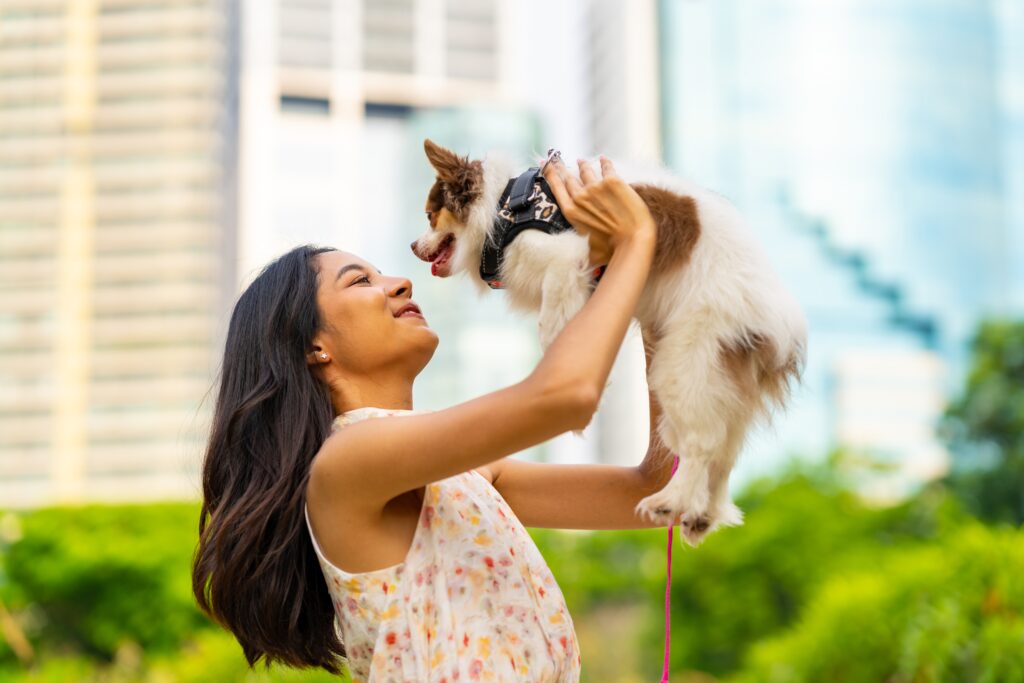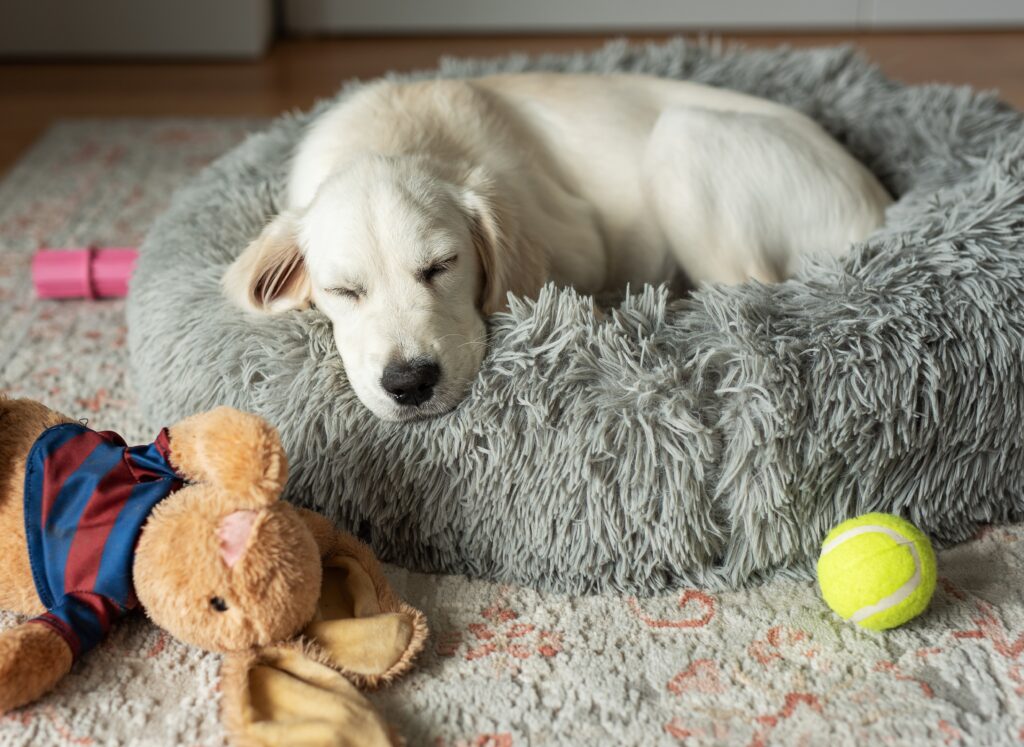When purchasing a puppy, it’s crucial to be cautious to ensure you’re dealing with a reputable breeder or organization and that the puppy’s health, temperament, and future well-being are not compromised.
Here’s a list of things you should be careful of to avoid pitfalls and ensure you’re getting a healthy, well-socialized puppy…
Avoid Puppy Mills
Red Flags
- Poor Living Conditions – Puppies raised in puppy mills are often housed in overcrowded, unsanitary conditions without sufficient socialization.
- Too Many Litters – Be wary of breeders with multiple litters at once or who seem to always have puppies available—this can be a sign of mass production rather than responsible breeding.
- Unwillingness to Share Information – Puppy mills are typically unwilling to show you the breeding conditions or health history of their dogs.
How to Protect Yourself
- Visit the breeder’s facility to ensure it is clean, spacious, and well-maintained.
- Make sure the breeder provides proof of veterinary care, vaccinations, and health screenings for both the puppy and its parents.
Watch for “Too Good to Be True” Deals
Red Flags
- Very Low Prices – A puppy offered at a significantly lower price than others from reputable breeders can be a sign of poor breeding practices, neglect, or health issues.
- Pressure to Make a Quick Decision – Avoid sellers who pressure you into making a fast decision or put pressure on you to purchase a puppy immediately.
How to Protect Yourself
- Be willing to wait for the right puppy at the right price. Reputable breeders often have waiting lists and won’t rush the sale.
- Research average costs for the breed you’re interested in, and be cautious of prices that fall far below average.
Inadequate Health Screening
Red Flags
- No Health Records – Be cautious of breeders or sellers who cannot provide complete health documentation or vaccination records for the puppy.
- No Genetic Testing – Reputable breeders usually test their breeding dogs for hereditary health conditions specific to the breed.
- Vague Answers About Vet Care – Be wary of breeders who don’t offer clear information about vet visits, vaccinations, deworming, or health guarantees.
How to Protect Yourself
- Ensure you get complete medical records that include details on vaccinations, deworming, and any treatments.
- Ask if the breeder has conducted genetic testing on the puppy’s parents for breed-specific issues (e.g., hip dysplasia, heart conditions).
- Make sure there’s a health guarantee that covers genetic issues or illnesses that may appear in the first year.
Unwillingness to Meet the Puppy’s Parents
Red Flags
- No Access to Parents – If the breeder or seller refuses or makes excuses not to let you meet the puppy’s parents, it could indicate hidden problems with health, behavior, or living conditions.
How to Protect Yourself
- Ask to meet both of the puppy’s parents. Meeting them gives you a chance to assess their temperament and health.
- Ensure the parents look healthy, well-socialized, and treated properly.
Poor Socialization Practices
Red Flags
- Fearful Behavior – Puppies that have been poorly socialized may act shy, fearful, or aggressive when meeting new people or in unfamiliar situations.
- Limited Exposure – If the puppy hasn’t been exposed to common household noises, different people, or other pets, it may struggle with new experiences.
How to Protect Yourself
- Ask the breeder or shelter about how they have socialized the puppies. Puppies should be exposed to various sounds, environments, and people between 3 and 12 weeks.
- Ensure the puppy shows a healthy level of curiosity, engagement, and comfort in different settings.
Unclear Breeding Practices
Red Flags
- Lack of Documentation – A reputable breeder should have a clear record of the puppy’s pedigree and the breeding history of the puppy’s parents.
- Irresponsible Breeding – Be wary of breeders who seem to breed solely for profit, without consideration of the puppies’ health, socialization, and welfare.
How to Protect Yourself
- Ask about the breeder’s philosophy and how they choose the dogs they breed. Ethical breeders breed dogs with care for the dog’s health and well-being, not just for monetary gain.
- Be cautious of breeders who only seem interested in selling puppies and do not care about the long-term well-being of the dogs.
Scams and Fraudulent Sellers
Red Flags
- Too Much Focus on the Transaction – Sellers who are more focused on closing the sale than the well-being of the puppy may have dishonest intentions.
- No Clear Contact Info – Avoid transactions that are done solely through text or email with limited, untraceable contact details.
How to Protect Yourself
- Stick to purchasing from reputable breeders, rescue groups, or shelters. Research and gather references before committing.
- Verify that the seller’s contact information is legitimate and traceable.
Lack of Post-Sale Support or Guarantees
Red Flags
- No Returns or Refunds – If the breeder or seller doesn’t offer a health guarantee, or if they don’t take responsibility for health issues that may arise shortly after adoption, it’s a red flag.
- No Offer of Training or Guidance – Responsible breeders or shelters will offer advice on training, socialization, and adjusting to life at home.
How to Protect Yourself
- Insist on a health guarantee that covers potential issues, like congenital defects.
- Choose breeders or shelters who are willing to offer ongoing support, including advice on adjusting the puppy to its new home, training, and health issues.
Overly Rushed or Stressful Environments
Red Flags
- Too Many Puppies – A breeder with too many litters may not have time to give proper attention to each puppy.
- Stressful, Overcrowded Areas – Puppies raised in overcrowded or chaotic environments can develop anxiety or other behavioral issues.
How to Protect Yourself
- Visit the breeder’s facility and make sure puppies are living in clean, safe, and comfortable conditions with adequate space and enrichment.
- If the puppy seems overly stressed or displays fearful behavior, that could be a sign of poor breeding or socialization practices.
Impulse Buying
Red Flags
- Purchasing Without Preparation – Avoid buying a puppy impulsively without considering your lifestyle, the time and effort involved, or whether the breed fits your needs.
How to Protect Yourself
- Take the time to research the breed’s characteristics, energy level, grooming needs, and potential health issues before making a decision.
- Ensure that you have the time, space, and resources to meet the puppy’s needs, including training and regular veterinary care.
Bottom Line
To ensure you’re purchasing a healthy, happy puppy…
- Work with reputable breeders, shelters, and rescues.
- Demand transparency, meet the puppy’s parents, and thoroughly vet the breeder or seller.
- Take your time to make a careful, informed decision, and avoid pressure or rushed sales. By being cautious, informed, and thoughtful, you ensure both your puppy’s and your future happiness.


